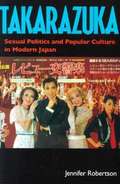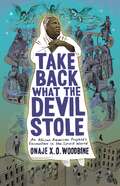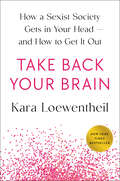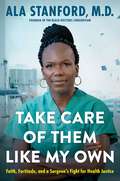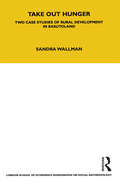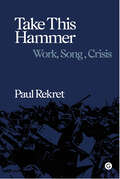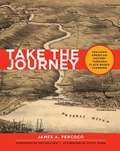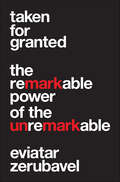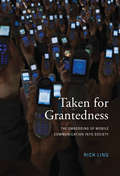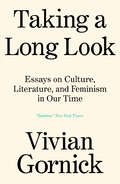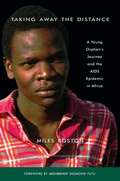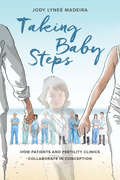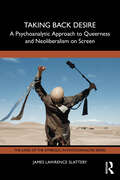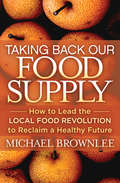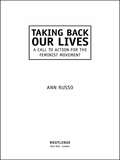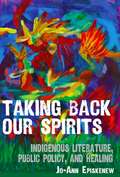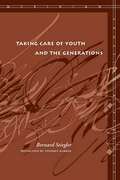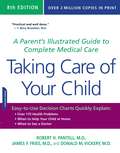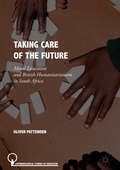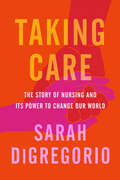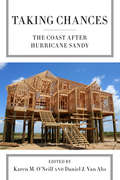- Table View
- List View
Takarazuka: Sexual Politics and Popular Culture in Modern Japan
by Jennifer E. RobertsonFounded in 1913 as a counterpart to the all-male Kabuki theater, the all-female Takarazuka Revue is world-famous today for its rococo musical productions and fanatically devoted fans. Anthropologist Jennifer Robertson draws from over a decade of research to explore how the Revue illuminates popular culture in 20th-century Japan. 29 photos.
Take Back What the Devil Stole: An African American Prophet's Encounters in the Spirit World
by Onaje X. WoodbineMs. Donna Haskins is an African American woman who wrestles with structural inequity in the streets of Boston by inhabiting an alternate dimension she refers to as the “spirit realm.” In this other place, she is prepared by the Holy Spirit to challenge the restrictions placed upon Black female bodies in the United States. Growing into her spiritual gifts of astral flight and time travel, Donna meets the spirits of enslaved Africans, conducts spiritual warfare against sexual predators, and tends to the souls of murdered Black children whose ghosts haunt the inner city.Take Back What the Devil Stole centers Donna’s encounters with the supernatural to offer a powerful narrative of how one woman seeks to reclaim her power from a lifetime of social violence. Both ethnographic and personal, Onaje X. O. Woodbine’s portrait of her spiritual life sheds new light on the complexities of Black women’s religious participation and the lived religion of the dispossessed. Woodbine explores Donna’s religious creativity and her sense of multireligious belonging as she blends together Catholic, Afro-Caribbean, and Black Baptist traditions. Through the gripping story of one local prophet, this book offers a deeply original account of the religious experiences of Black women in contemporary America: their bodies, their haunted landscapes, and their spiritual worlds.
Take Back Your Brain: How a Sexist Society Gets in Your Head--and How to Get It Out
by Kara LoewentheilNEW YORK TIMES BESTSELLERUSA TODAY #1 NONFICTION BESTSELLERPUBLISHERS WEEKLY BESTSELLERA manual for every woman who wants to stop endless negative self-talk, create unshakable confidence, and jump-start a life of joy and power. It all begins with your thoughts.I never look good in tight skirts. I can&’t ask for a raise or my boss will think I&’m greedy. I&’m getting too old to find a partner. I&’m a bad mom. I&’m always behind. I&’ll never be good enough. What if every time you had a self-critical thought, you heard it in a man&’s voice? The truth is not far off. Living in a patriarchy, women absorb a lifetime of messages that say your worth is defined by your looks, your accomplishments, and how well you take care of everyone around you. In fact, these messages are so pervasive that, even knowing they exist, they still manage to program themselves into our brains. The result is that women end up feeling anxious, guilty, and vaguely ashamed of themselves no matter how much they do for others or achieve for themselves.So how do we deprogram our thoughts from patriarchy&’s corrosive influence? And once we do, how can we create new, self-empowering beliefs?Master Certified Life Coach and host of the UnF*ck Your Brain podcast Kara Loewentheil knows how. Despite graduating from Harvard Law School and getting her dream job, Kara spent her twenties and thirties feeling insecure and anxious, until she learned how to change her thoughts—which led her to become a coach. In Take Back Your Brain, she draws on cognitive psychology, feminist theory, and years of experience as a neuroplasticity-focused coach to break down how the patriarchy hijacks women&’s brains, and how women can get free. To bridge the gap between your inner voice and your true potential, she says, you must begin with your thoughts. By using the skills in this book to literally rewire your brain, you can create new thought patterns that will directly transform outcomes in your life.Ultimately, Take Back Your Brain invites you to replace the thoughts that no longer serve you and make room for a kind of confidence you never thought possible. Because when women unleash their true power, they awaken new possibilities for the world.
Take Care of Them Like My Own: Faith, Fortitude, and a Surgeon's Fight for Health Justice
by Ala StanfordThe founder of the Black Doctors Consortium highlights the devastating racial injustices in our healthcare system in this inspirational memoir and empowering call to action.Dr. Ala Stanford knew she wanted to be a doctor by the time she was eight years old. But role models were few and far between in her working-class North Philly neighborhood. Her teachers were dismissive, and the realities of racism, sexism, and poverty threatened to derail her at every turn. Nevertheless, thanks to her faith, family, and the sheer strength of her will, today she is one of the vanishingly small number of Black women surgeons in America—and an unrelenting force in the fight for health justice. In Take Care of Them Like My Own, Dr. Stanford shares an unflinching account of her story, explaining how her experiences on both sides of the scalpel have informed her understanding of America&’s racial health gap, an insidious and lethal form of inequality that exacts a devastating toll on Black communities across the country, affluent and underserved alike. When Covid-19 arrived in her hometown of Philadelphia, she knew it would disproportionately affect the Black population. As the city stood idly by, unwilling or unable to protect its most vulnerable citizens, Dr. Stanford took matters into her own hands. She rented a van, made some calls, and began administering tests in church parking lots. Soon, she found herself at the helm of a powerful grassroots campaign that successfully vaccinated tens of thousands of Philadelphians. She and her movement are living proof that by drawing on faith, community, and inner strength, everyday people can affect tremendous change. Part memoir, part manifesto for health equality and justice, Take Care of Them Like My Own offers urgent lessons about the power of communities working together to take care of one another and the importance of fighting for a healthcare system that truly fulfills its promise to all Americans.
Take More Action: How To Change The World
by Craig Kielburger Marc Kielburger Deepa ShankaranTake More Action includes invaluable material on character education, ethical leadership, effective activism and global citizenship. Take More Action features the Global Citizen's Toolbox, the Seven Steps to Social Action and indispensable resources to get young people started on their journey. Profiles of accomplished youth finding their own voices will inspire the next generation of world-changers. Ideal for Grades 10 and up, Take More Action paves the way for a lifetime of social action.
Take My Grief Away: Voices from the War in Ukraine
by Katerina Gordeeva***LONGLISTED FOR THE 2024 MOORE PRIZE FOR HUMAN RIGHTS WRITING***'Read this book. Don't put it off until you'll supposedly be strong enough and ready for the reading. If you put it off, you'll find yourself defenseless in the face of evil.'- Svetlana Alexievich, winner of the Nobel Prize in Literature and author of Chernobyl PrayerIn the darkest of times, in the midst of it all, a journalist has one single task: to document everything that is happening. It is time to slow down and listen to the voice of a human being.On 24 February 2022, Russia invaded Ukraine. Since that day, prize-winning independent journalist Katerina Gordeeva has travelled to refugee centres across Europe to record the human voice and cost of war. Take My Grief Away reveals twenty-four raw, heartbreaking first-person accounts from people united in grief and their first-hand experiences of the brutality and senselessness of war. These twenty-four voices will transform what you think you know about war, grief and human nature.
Take Out Hunger: Two Case Studies of Rural Development in Basutoland Volume 39 (London School Of Economics Monographs On Social Anthropology Ser. #No. 39)
by S. WallmanDevelopment schemes are common throughout the third world. Many fail, but the reasons for failure or success are only too often not adequately studied. In this monograph two schemes started in Basutoland - now Lesotho - are intensively analysed and compared: the first, which was abandoned in 1961, primarily by means of documentary material; the second, which was and still is successful in at least part of the area, mainly through observation and field research. The analysis reveals the factors making for success or failure, particularly in the fields of politics, economics, and communication. The relevance of the study extends beyond Lesotho and even Africa, the analysis dealing with problems common to introduced social change and development in any part of the world.
Take This Hammer: Work, Song, Crisis (Goldsmiths Press / Sonics Series)
by Paul RekretA study of contemporary music in light of transformations to work and social life.The emergence of the popular music industry in the early twentieth century not only drove a wedge between music production and consumption, it also underscored a wider separation of labor from leisure and of the workplace from the domestic sphere. These were changes characteristic of an industrial society where pleasure was to be sought outside of work, but these categories have grown increasingly porous today. As the working day extends into the home or becomes indistinguishable from leisure time, so the role and meaning of music in everyday life changes too. In arguing that the experience of popular music is partly conditioned by its segregation from work and its restriction to the time and space of leisure—the evening, the weekend, the dancehall—Take This Hammer shows how changes to work as it grows increasingly precarious, part-time, and temporary in recent decades, are related to transformations in popular music. Connecting contemporary changes in work and the economy to tendencies in popular music, Take This Hammer shows how song-form has both reflected developments in contemporary capitalism while also intimating a horizon beyond it. From online streaming and the extension of the working day to gentrification, unemployment and the emergence of trap rap, from ecological crisis and field recording to automation and trends in dance music, by exploring the intersections of work and song in the current era, not only do we gain a new understanding of contemporary musical culture, we also see how music might gesture towards a horizon beyond the alienating experience of work in capitalism itself.
Take Up Thy Bed and Walk: Death, Disability and Cure in Classic Fiction for Girls
by Lois KeithMany Victorian children's books written for girls show a lively, rebellious heroine who, by the end of the story, is tamed and ready to take on the role of submissive young woman. In a number of works, a temporary disability is the crucible which teaches these headstrong girls lessons in patience and humility. Sometimes goodness and will-power are rewarded with a miraculous cure. In other works a dying child serves as a lesson to the living, modeling endurance and faith. Lois Keith explores such themes in children's classics including Little Women, Heidi, The Secret Garden, and Pollyanna. In her final chapter she considers depictions of illness and disability and children's literature of the mid to late 20th century.
Take the Journey: Teaching American History Through Place-Based Learning
by James PercocoIn Take the Journey: Teaching American History Through Place-Based Learning,' author, historian, and educator James Percoco invites you and your students to the places where many events in American history happened. The Journey Through Hallowed Ground is a 180-mile National Heritage area encompassing such historic sites as the Gettysburg battlefield and Thomas Jefferson's home, Monticello. Though it might prove difficult to visit these particular sites with your students, Percoco argues that every community has a story that can be connected to larger themes in American history and that placed-based history education can be made a part of every classroom, from Nevada to Washington to Pennsylvania. Filled with students' voices and an enthusiasm for American history, Take the Journey offers the following: Practical and easy-to-implement lessons Classroom-tested materials Specific directions for employing place-based best practices in the classroom Ways to meet state standards without sacrificing teacher creativity or hands-on learning Lists of resources and primary source materialsSo bring your students along and let them discover the twists and turns offered by history and the Journey Through Hallowed Ground. '
Taken for Granted: The Remarkable Power of the Unremarkable (WILDGuides)
by Eviatar ZerubavelHow the words we use—and don’t use—reinforce dominant cultural normsWhy is the term "openly gay" so widely used but "openly straight" is not? What are the unspoken assumptions behind terms like "male nurse," "working mom," and "white trash"? Offering a revealing and provocative look at the word choices we make every day without even realizing it, Taken for Granted exposes the subtly encoded ways we talk about race, gender, sexual orientation, religion, social status, and more.In this engaging and insightful book, Eviatar Zerubavel describes how the words we use--such as when we mark "the best female basketball player" but leave her male counterpart unmarked—provide telling clues about the things many of us take for granted. By marking "women's history" or "Black History Month," we are also reinforcing the apparent normality of the history of white men. When we mark something as being special or somehow noticeable, that which goes unmarked—such as maleness, whiteness, straightness, and able-bodiedness—is assumed to be ordinary by default. Zerubavel shows how this tacit normalizing of certain identities, practices, and ideas helps to maintain their cultural dominance—including the power to dictate what others take for granted.A little book about a very big idea, Taken for Granted draws our attention to what we implicitly assume to be normal—and in the process unsettles the very notion of normality.
Taken for Grantedness: The Embedding of Mobile Communication into Society (The\mit Press Ser.)
by Richard LingAn examination of how the mobile phone has become part of the fabric of society—as did such earlier technologies as the clock and the car.Why do we feel insulted or exasperated when our friends and family don't answer their mobile phones? If the Internet has allowed us to broaden our social world into a virtual friend-net, the mobile phone is an instrument of a more intimate social sphere. The mobile phone provides a taken-for-granted link to the people to whom we are closest; when we are without it, social and domestic disarray may result. In just a few years, the mobile phone has become central to the functioning of society. In this book, Rich Ling explores the process by which the mobile phone has become embedded in society, comparing it to earlier technologies that changed the character of our social interaction and, along the way, became taken for granted.Ling, drawing on research, interviews, and quantitative material, shows how the mobile phone (and the clock and the automobile before it) can be regarded as a social mediation technology, with a critical mass of users, a supporting ideology, changes in the social ecology, and a web of mutual expectations regarding use. By examining the similarities and synergies among these three technologies, Ling sheds a more general light on how technical systems become embedded in society and how they support social interaction within the closest sphere of friends and family.
Taking A Long Look: Essays on Culture, Literature and Feminism in Our Time
by Vivian GornickOne of our most vital and incisive writers on literature, feminism, and knowing one's selfFor nearly fifty years, Vivian Gornick's essays, written with her characteristic clarity of perception and vibrant prose, have explored feminism and writing, literature and culture, politics and personal experience. Drawing writing from the course of her career, Taking a Long Look illuminates one of the driving themes behind Gornick's work: that the painful process of understanding one's self is what binds us to the larger world.In these essays, Gornick explores the lives and literature of Alfred Kazin, Mary McCarthy, Diana Trilling, Philip Roth, Joan Didion, and Herman Melville; the cultural impact of Silent Spring and Uncle Tom's Cabin; and the characters you might only find in a New York barber shop or midtown bus terminal. Even more, Taking a Long Look brings back into print her incendiary essays, first published in the Village Voice, championing the emergence of the women's liberation movement of the 1970s.Alternately crackling with urgency or lucid with insight, the essays in Taking a Long Look demonstrate one of America's most beloved critics at her best.
Taking America Back: The Conservative Movement and the Far Right
by David Austin WalshA provocative look at the relationship between the far right and the American conservative movement from the 1930s to the end of the Cold War Since 2016, many commentators have expressed shock at the so-called rise of the far right in America at the expense of "responsible" and "respectable" conservatism. But is the far right an aberration in conservative politics? As David Austin Walsh shows, the mainstream conservative movement and the far right have been intertwined for nearly a century, and both were born out of a "right-wing popular front" linking racists, anti-Semites, and fascists in a broad coalition opposed to socialism, communism, and New Deal liberalism. Far from being outliers in the broader conservative coalition, these extremist elements were foundational in the creation of a right‑wing political culture centered around shared political enemies, a penchant for conspiracy theories, and a desire to restore America to its "authentic" pre–New Deal values. The popular front included Merwin Hart, a New York business lobbyist active in far-right circles who became a lobbyist for the Franco regime in Spain, the original "America First" movement, the movement to prevent Jewish immigration to the United States after World War II, the John Birch Society, the American Nazi Party, the George Wallace presidential campaign of 1968, the fight over the National Endowment for the Humanities, and Pat Buchanan’s support of Nazi war criminal John Demjanjuk during the Reagan Administration. And connecting this disparate coalition was William F. Buckley, Jr., the editor of National Review and America’s leading "responsible conservative.&rdquo
Taking Away the Distance: A Young Orphan's Journey and the AIDS Epidemic in Africa
by Miles RostonIn this emotional story of hope and inspiration, an African boy, orphaned by AIDS becomes a catalyst for AIDS orphans worldwide. Living in a shantytown in Kenya, Kevin Sumba's life was one of loneliness and hardship. Yet he was determined to get an education. Miles Roston, a documentary filmmaker, first met Kevin while making a film on AIDS orphans. He found that this particular boy touched his heart in a way he hadn't anticipated. Together, they set out to answer "Kevin's Questions" about the AIDS epidemic and more specifically, Kevin's situation. Taking Away the Distance takes us on a singular journey, as powerful policymakers and those working at a grassroots level deal with the direct, and at times confronting, questions of one boy. Along the way, we also meet people directly impacted by the epidemic and face their lives heroically: from children surviving homelessness on Nairobi's streets to a mother on her deathbed whose only thought is how to care for the children she will leave behind. As Kevin and Roston form a bond of love and respect, each learning from the other, we discover just how much our own lives can change if we dare to help.
Taking Baby Steps: How Patients and Fertility Clinics Collaborate in Conception
by Jody Lyneé MadeiraIn Taking Baby Steps, Jody Lyneé Madeira takes readers inside the infertility experience, from dealing with infertility-related emotions to forming treatment relationships with medical professionals and confronting difficult medical decisions. Based on hundreds of interviews, this book investigates how women, men, and medical professionals negotiate infertility’s rocky terrain to create life and build families—a journey across personal, medical, legal, and ethical minefields that can test mental and physical health, friendships and marriages, spirituality, and financial security.
Taking Back Desire: A Psychoanalytic Approach to Queerness and Neoliberalism on Screen (The Lines of the Symbolic in Psychoanalysis Series)
by James Lawrence SlatteryTaking Back Desire studies film, television and video art texts through a Lacanian prism to restore a sense of queer as troubling identity and resistance to neoliberal forms of inclusion.James Lawrence Slattery illuminates how the framing of desire, identity, enjoyment, resistance and knowledge contribute to the investment in neoliberal formations of being and success, despite the corrosive effects neoliberalism has had for much of society. The book does not read queerness on screen as a discernible group of characters or narrative formulas, but as a point that meaning fails in the visual and temporal field. Examining the interrelation of the real, the imaginary, and the symbolic in contemporary politics and contemporary media, Slattery investigates how a diverse selection of moving image texts forge queerness as a relationship to the lack, while crucially resisting the creation of a new or definitive ‘canon’.Taking Back Desire will be essential reading for academics and scholars of Freudian and Lacanian psychoanalysis, queer theory, late capitalism, film, television and media studies, sexuality studies, critical race theory, cultural studies and feminist theory.
Taking Back Our Food Supply: How to Lead the Local Food Revolution to Reclaim a Healthy Future
by Michael BrownleeSeven steps you can take NOW to ignite a local food revolution and help reverse the devastation of the industrial food system! Our food supply has been hijacked by an unholy alliance of multinational corporations in big agriculture, big food, and big pharma. This industrial food complex is destroying our natural food supply, making us less healthy, and rapidly destroying the biosphere. Restoring food sovereignty and security is one of the most important causes of our time—requiring nothing less than a grassroots revolution. In Taking Back Our Food Supply, Michael Brownlee shows readers how to master the seven steps of building a resilient regional foodshed and illustrates how to ignite the local food revolution in their community to a radically increased impact, effectiveness, and scale.
Taking Back Our Lives: A Call to Action for the Feminist Movement
by Ann RussoFirst published in 2001. Routledge is an imprint of Taylor & Francis, an informa company.
Taking Back Our Spirits: Indigenous Literature, Public Policy, and Healing
by Jo-Ann EpiskenewFrom the earliest settler policies to deal with the “Indian problem,” to contemporary government-run programs ostensibly designed to help Indigenous people, public policy has played a major role in creating the historical trauma that so greatly impacts the lives of Canada’s Aboriginal peoples. Taking Back Our Spirits traces the link between Canadian public policies, the injuries they have inflicted on Indigenous people, and Indigenous literature’s ability to heal individuals and communities. Episkenew examines contemporary autobiography, fiction, and drama to reveal how these texts respond to and critique public policy, and how literature functions as “medicine” to help cure the colonial contagion.
Taking Care Of Youth And The Generations
by Bernard StieglerTaking Care exposes the carelessness of these industries and urges the reader to re-enter the "battle for intelligence" against the drive-oriented culture of short-term ("short-circuited") attention characteristic of the negative aspects of the new technologies.
Taking Care of Your Child
by Robert H. Fries James F. Vickery Donald M. PantellOver a million and a half families already use Taking Care of Your Child to help keep their children healthy. Updated with the most recent research and recommendations, this award-winning guide discusses common medical problems, as well as emotional issues such as new siblings and school challenges. The authors even provide forms for medical, growth, and immunization records. And unlike other children's health books, this comprehensive guide is useful from birth through a child's adolescence. Taking Care of Your Child is easy to use, even in a crisis. Simply look up a symptom, and you find a complete explanation of probable causes, how serious they are, and how you might quickly relieve your child's problem at home. Easy-to-follow decision charts show parents exactly when to take a child to see a doctor. This book covers more than 100 common complaints-injuries and allergies, childhood diseases-with especially clear advice on handling emergencies.
Taking Care of the Future: Moral Education And British Humanitarianism In South Africa (Anthropological Studies Of Education Ser.)
by Oliver PattendenTaking Care of the Future examines the moral dimensions and transformative capacities of education and humanitarianism through an intimate portrayal of learners, volunteers, donors, and educators at a special needs school in South Africa and a partnering UK-based charity. Drawing on his professional experience of “inclusive education” in London, Oliver Pattenden investigates how systems of schooling regularly exclude and mishandle marginalized populations, particularly exploring how “street kids” and poverty-afflicted young South Africans experience these dynamics as they attempt to fashion their futures. By unpacking the ethical terrains of fundraising, voluntourism, Christian benevolence, human rights, colonial legacies, and the post-apartheid transition, Pattenden analyzes how political, economic and social aspects of intervention materialize to transform the lives of all those involved.
Taking Care: The Story of Nursing and Its Power to Change Our World
by Sarah DiGregorioIn this sweeping cultural history of nursing from the Stone Age to the present, the critically acclaimed author of Early pays homage to the profession and makes an urgent call for change. Nurses have always been vital to human existence. A nurse was likely there when you were born and a nurse might well be there when you die. Familiar in hospitals and doctors’ offices, these dedicated health professionals can also be found in schools, prisons, and people’s homes; at summer camps; on cruise ships, and even at NASA. Yet despite being celebrated during the Covid-19 epidemic, nurses are often undermined and undervalued in ways that reflect misogyny and racism, and that extend to their working conditions—and affect the care available to everyone. But the potential power of nursing to create a healthier, more just world endures.The story of nursing is complicated. It is woven into war, plague, religion, the economy, and our individual lives in myriad ways. In Taking Care, journalist Sarah DiGregorio chronicles the lives of nurses past and tells the stories of those today—caregivers at the vital intersection of health care and community who are actively changing the world, often invisibly. An absorbing and empathetic work that combines storytelling with nuanced reporting, Taking Care examines how we have always tried to care for each other—the incredible ways we have succeeded and the ways in which we have failed. Fascinating, empowering and significant, it is a call for change and a love letter to the nurses of yesterday, today, and tomorrow.
Taking Chances: The Coast after Hurricane Sandy
by Joanna Burger Tammy L. Lewis Kenneth A. Gould Robert B. Gramling Mark Alan Hewitt Mariana Leckner Bonnie Mccay Briavel Holcomb Angela Oberg Melanie Mcdermott Steven G. Decker Professor Karen M. O'Neill Patricia M. Clay Daniel Redlaswk Frank A. Felder Clinton J. Andrews Adelle Thomas Lisa L. Colburn Larry Niles Daniel Baldwin Hess David A. Robinson Brian W. Conley James K. Mitchell Ashley Koning Shankar Chandramowli Daniel J. Van Abs Julia FlaggHumanity is deeply committed to living along the world's shores, but a catastrophic storm like Sandy--which took hundreds of lives and caused many billions of dollars in damages--shines a bright light at how costly and vulnerable life on a shoreline can be. Taking Chances offers a wide-ranging exploration of the diverse challenges of Sandy and asks if this massive event will really change how coastal living and development is managed. Bringing together leading researchers--including biologists, urban planners, utilities experts, and climatologists, among others--Taking Chances illuminates reactions to the dangers revealed by Sandy. Focusing on New Jersey, New York, and other hard-hit areas, the contributors explore whether Hurricane Sandy has indeed transformed our perceptions of coastal hazards, if we have made radically new plans in response to Sandy, and what we think should be done over the long run to improve coastal resilience. Surprisingly, one essay notes that while a large majority of New Jerseyans identified Sandy with climate change and favored carefully assessing the likelihood of damage from future storms before rebuilding the Shore, their political leaders quickly poured millions into reconstruction. Indeed, much here is disquieting. One contributor points out that investors scared off from further investments on the shore are quickly replaced by new investors, sustaining or increasing the overall human exposure to risk. Likewise, a study of the Gowanus Canal area of Brooklyn shows that, even after Sandy swamped the area with toxic flood waters, plans to convert abandoned industrial lots around the canal into high-density condominiums went on undeterred. By contrast, utilities, emergency officials, and others who routinely make long-term plans have changed operations in response to the storm, and provide examples of adaptation in the face of climate change. Will Sandy be a tipping point in coastal policy debates--or simply dismissed as a once-in-a-century anomaly? This thought-provoking collection of essays in Taking Chances makes an important contribution to this debate.
